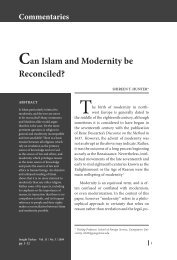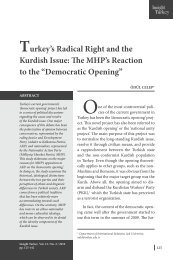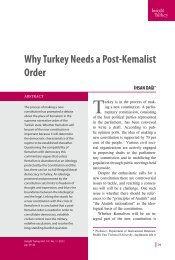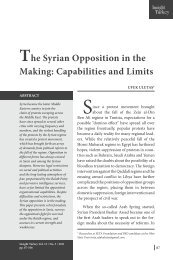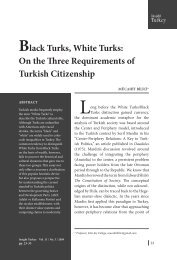Culture of Co-existence in Islam: The Turkish Case
Culture of Co-existence in Islam: The Turkish Case
Culture of Co-existence in Islam: The Turkish Case
Create successful ePaper yourself
Turn your PDF publications into a flip-book with our unique Google optimized e-Paper software.
ALİ BARDAKOĞLU<br />
<strong>The</strong>re is a widespread<br />
misunderstand<strong>in</strong>g and<br />
misperception <strong>of</strong> <strong>Islam</strong> as<br />
a religion, and <strong>of</strong> Muslims<br />
as members <strong>of</strong> the global<br />
community<br />
ma<strong>in</strong> textual sources <strong>of</strong> <strong>Islam</strong> itself to see<br />
whether they warrant the images <strong>of</strong> <strong>Islam</strong><br />
that are prevalent <strong>in</strong> the western world.<br />
In the second part <strong>of</strong> the article I will<br />
focus on the Ottoman-<strong>Turkish</strong> experience<br />
<strong>of</strong> peaceful co-<strong>existence</strong> between<br />
Muslims, Christians and Jews <strong>in</strong> a state<br />
that governed a populous <strong>of</strong> religious, ethnic and cultural diversity for many centuries.<br />
Given the fact that we live <strong>in</strong> a conflict-ridden world, a look at the Ottoman-<strong>Turkish</strong><br />
experience, I believe, may facilitate positive th<strong>in</strong>k<strong>in</strong>g about pluralism.<br />
This historical experience also encourages us to f<strong>in</strong>d legal and political<br />
<strong>in</strong>struments that would contribute to the management <strong>of</strong> grow<strong>in</strong>g diversity <strong>in</strong> a<br />
globaliz<strong>in</strong>g world.<br />
In the third part <strong>of</strong> the article, I will briefly discuss the position <strong>of</strong> the Presidency<br />
<strong>of</strong> Religious Affairs and its role <strong>in</strong> facilitat<strong>in</strong>g a culture <strong>of</strong> peaceful co-<strong>existence</strong><br />
<strong>in</strong> modern Turkey.<br />
<strong>The</strong> Image <strong>of</strong> <strong>Islam</strong> and Muslims <strong>in</strong> the West<br />
<strong>The</strong> image <strong>of</strong> <strong>Islam</strong> and <strong>of</strong> Muslims is subject to constant construction by the<br />
media, <strong>in</strong>tellectual and political discourses and the popular cultural <strong>in</strong>dustry.<br />
Muslims are largely perceived through the <strong>in</strong>fluence these forces which themselves<br />
are <strong>in</strong>formed by social, political and cultural policies and <strong>in</strong>terests. On the<br />
whole, <strong>in</strong> the eyes <strong>of</strong> the west, <strong>Islam</strong> and Muslims have a negative image that they<br />
do not deserve. A close exam<strong>in</strong>ation <strong>of</strong> the relevant political, <strong>in</strong>tellectual and<br />
popular discourses will demonstrate that there is a widespread misunderstand<strong>in</strong>g<br />
and misperception <strong>of</strong> <strong>Islam</strong> as a religion, and <strong>of</strong> Muslims as members <strong>of</strong> the<br />
global community. Suffice it to cite three well-known statements by public figures<br />
reflect<strong>in</strong>g bias and prejudice aga<strong>in</strong>st <strong>Islam</strong>. Frankl<strong>in</strong> Graham, son <strong>of</strong> evangelist<br />
Billy Graham, has argued that ‘the Qur’an speaks <strong>of</strong> violence aga<strong>in</strong>st Christians<br />
and Jews.’ For him <strong>Islam</strong> is ‘a very evil and wicked religion.’ Jerry Falwell <strong>of</strong> the<br />
Christian <strong>Co</strong>alition, for his part, has called the Prophet Muhammad a ‘terrorist;’<br />
Pat Robertson called him a ‘robber and brigand.’ 1 It is beyond the scope <strong>of</strong> this<br />
presentation to give lengthy examples drawn from political and <strong>in</strong>tellectual discourses.<br />
However, we can look at their impact on the public op<strong>in</strong>ion and popular<br />
perceptions about <strong>Islam</strong> <strong>in</strong> the west today.<br />
A recent study by the Pew Foundation (2007) supports our view about the<br />
112



